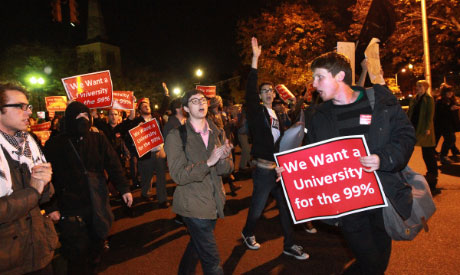
In a Wednesday, 9 Nov., photo, protesters make their way to the grounds of Harvard Law School for a Occupy Harvard rally after being denied access to Harvard Yard to assemble, (Photo: AP).
Protest tents have sprouted on Harvard's well-groomed campus, with students accusing their elite university of educating the "one percent" they blame for the global financial crisis.
The protesters -- newcomers to the Occupy Wall Street movement launched to oppose alleged corporate greed -- are demanding that America's most prestigious academic institution contribute to an economically fairer world.
The nationwide movement was in crisis Tuesday after police demolished the two-month-old tent camp in New York's Zuccotti Park -- which has inspired similar protests in several US cities -- in a surprise early-morning raid.
The protesters were later allowed to return, but are banned from setting up the tents that have been a dominant feature of the two-month-old movement.
Occupy Harvard meanwhile passed a quiet day -- its seventh -- with two dozen tents pitched among the golden fall leaves in Harvard Yard, a far cry from the more raucous tent camps set up in the heart of major cities.
The students accuse Harvard's world-famous business school -- which has launched the careers of countless Wall Street financiers -- of producing the generation of bankers who they say have wrecked the US economy.
"Year after year, Harvard supplies traders and analysts and financial advisers who go on to run the economy into the ground," says Harvard graduate student Amanda Haziz-Ginsberg, 22.
"Harvard is a university of the one percent, but we want it to be an institution for the 99 percent," she said, echoing the slogan of Occupy Wall Street, which has protested against the increasing concentration of US wealth.
It has also borrowed the larger movement's methods, including setting up tents and holding nightly "general assemblies" to set goals.
But the students are also focusing on concerns specific to Harvard, demanding that the university pay its janitors more and stop investing in corporations that the protestors consider unsavory.
Signs target the student body as well as university administrators, with one reading: "Harvard students save your souls. Work for people, not for gold."
The irony that the protesting students are virtually assured of a prosperous future because they can list Harvard on their resumes isn't lost on them.
Their privileges, they say, propel them to demand that Harvard chart a radically new course in educating future leaders, choose socially beneficial investments and pay better wages to its workers.
"I see this as a fight for Harvard's soul," says Kavi Bhalla, 37, a research scientist at the Harvard School of Public Health.
"I want people who hold positions of power in the university to look out their windows and say they can't continue on the path they are on."
The university has mostly tolerated the protests.
But last week it closed the gates to Harvard Yard to all but those holding school IDs after the protesters tried to occupy the university's equivalent of holy ground: a patch of grass in front of the statue of clergyman John Harvard, the university's namesake, who left hundreds of books to the school in 1638.
University officials declined requests for comment, but a newly created website says the decision to close the gates was made out of "safety concerns."
The website also says that janitors' hourly wages have increased 36 percent since 2005.
The decision to close off the red-walled Yard -- which includes freshmen dorms, classrooms, chapels and libraries -- has divided the campus, with some professors lecturing outside to protest the measure, annoying some students.
"My professor protested the university's decision to lock the gates, but made me complicit in his support of the protestors," said Daniel Frim, 19.
"I attended his lecture (outside the usual classroom), but I believe the university was right to close the gates for safety reasons."
Tourists and prospective students -- who would usually have flocked to the John Harvard statue to take pictures and rub his left shoe for good luck -- were also affected by the Yard's closing.
But some of the activists, who on Monday night voted not to set an end date for their occupation, say that the tents will eventually fold as the Thanksgiving and Christmas holidays approach and winter brings serious snow.
Iman James, 20, said the tents have sparked an overdue discussion about Harvard's role in an increasingly globalized world still wrestling with the consequences of Wall Street's 2008 meltdown.
"The tents are a symbol," she said. "But Occupy Harvard doesn't end after the tents come down."
Short link: